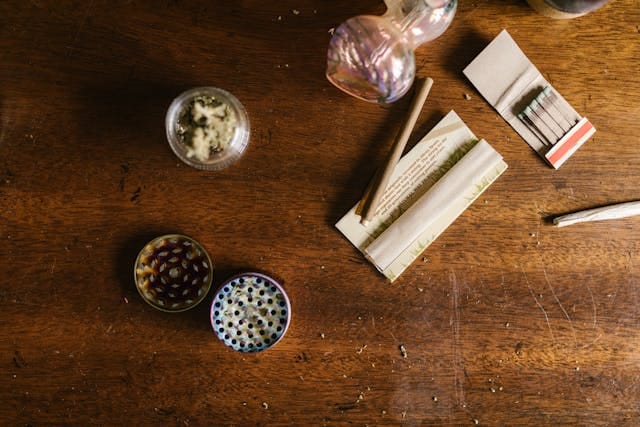23 Things I Discovered After I Quit Smoking Weed

If you were smoking pot every day for years like I was, then you know that stopping isn’t easy - and seeing what’s waiting for you on the other side is difficult from where you’re standing.
Here are the tips, tricks, and observations I gathered after quitting pot following 14 years of being a stoner.
- I thought my motivation and productivity would skyrocket after quitting.
It did in the short run, but after a while, my productivity went back to the same level as when I was getting high. Don’t let it get you down.
Over the long run, you’ll look back and realize that your productivity did increase - just in smaller increments you didn’t notice in the moment.
- Quitting weed is similar to quitting cigarettes.
The big difference is that quitting tobacco is hardest at the start, while quitting weed gets harder later on.
- Once I got free from my weed habit, the weight of everything I’d done while high hit me hard.
I was a stoner for 14 years - that’s a long time. Maybe it was my age catching up to me, but I felt like I’d wasted a huge portion of my life - time that I’ll never get back.
I felt like an abject loser and an utter failure.
Even though I had some solid accomplishments during my stoner days, I know I could’ve done more. I could’ve done better.
The regret sat with me for a long time.
The good news is that as long as you’re still breathing, there’s time to change.
When you’re high all the time, you don’t notice how much you’re letting slip away. The reality of your choices is going to hit hard when the fog lifts.
- Do NOT make major life decisions while you’re quitting.
This isn’t the time to quit your job, move across the country, or break up with your longtime girlfriend.
You are not yourself - especially in the early stages. Your mood is all over the place, and your body is trying to reboot its endocannabinoid system.
Recognize that you’re in a fragile state and the decisions you make during this time have long lasting consequences.

- Many people experience insomnia during the early stages of quitting weed. I slept pretty well when I was high. I had maybe two or three rough nights during the first week, then my sleep returned to normal.
- You don’t dream very often when you’re high every night. When you quit, your brain tries to cram all the missed dreams into one session. It can feel intense.
- Prayer goes a long way – and that extends to quitting pot. Don’t be afraid to ask God for help, and don’t feel bad asking others to pray for you.
When cravings are strong, recite a short prayer like the Jesus prayer – “Lord Jesus Christ. Son of God. Have mercy on me. A sinner.”
- The main thing I was using weed to escape from was boredom.
South Park really hit the nail on the head when Randy Marsh says “Well Stan, the truth is marijuana probably isn’t going to make you kill people, and it most likely isn’t gonna fund terrorism, but, well son, pot makes you feel fine with being bored - and it’s when you’re bored that you should be learning some new skill or discovering some new science or being creative.”
- Holidays are the worst time to be sober - especially Christmas break.
It’s one thing to have a day off. When there’s a week of no work, bad weather, everything is closed, and there is no shortage of parties - that’s when it gets challenging.
The last Christmas break, I took on some renovations around my condo. It kept me busy. This coming year, I plan to update my bathroom.

- Speaking of holidays, the biggest error I made was quitting on a holiday (Labour Day). Pick a quitting date when you’re already working or engaged in some kind of routine where you can distract yourself.
- Have a plan for how you’re going to deal with friends and family you used to smoke with.
Most people should be understanding - but a lot of stoners have friends where getting high is the main thing you do together.
If it’s going to be a problem, maybe hanging out with those people shouldn’t be an option.
I recently got together with some old friends. I joined them outside while they were smoking a joint.
When it was passed to me, I just took it and handed it off to the next person.
When they asked why I wasn’t smoking, I told them I quit. They congratulated me, and it wasn’t an issue for the rest of the night.
- It helps to have someone to talk to. It could be a friend, family member, or even your priest.
There’s no need to talk their ear off, but if there’s someone who cares about you, let them know that you’re quitting.
For me, this was my mom. She was very supportive and it was helpful to share what I was going through with someone else.
- The most useful online resource I found was Dr. Frank Michalski of Addiction Mindset on YouTube.
He specializes in helping people quit minor addictions such as cannabis, nicotine, pornography, and caffeine.
You’ll realize you’re not alone - there are plenty of people just like you, overcoming bad habits to become better versions of themselves.
- Some people believe that they need some kind of reward system when they stop smoking.
Dr. Frank at Addiction Mindset talks about how he makes a parfait with mixed berries and Greek yogurt most nights. He replaced his nightly ritual of getting stoned with a healthy snack.
I didn’t think I needed that, but on weekends I was binging junk food. Eventually I got more serious about my diet and stopped.
If you think a healthy replacement habit for weed will be beneficial, I say go for it.

- Physical exercise is important and especially beneficial when quitting weed. The depression during the Crashing Out phase would have been a nightmare if I wasn’t going to the gym.
- My workout habits changed a little.
Smoking weed is conducive to practicing yoga. Its not good for lifting weights. And it doesn’t matter whether you’re high or sober - cardio sucks.
- The food I ate changed. My grocery cart used to be 1/3 meat, 1/3 fruits, veggies, and side dishes, and 1/3 junk food to munch on when I got high.
After I quit, my junk food consumption dropped drastically. I still binged on weekends for awhile, but now I eat much healthier.
- The activity that changed the most after I quit weed: listening to music.
I’m talking about just sitting down and listening to music - nothing else.
I would do it for hours at a time.
Now, I have music playing in the background while I do other things. It’s no longer the main activity.
The type of music I like now is a little different, but I still enjoy most of the same songs I used to – even if they were stoner anthems.
- The activity I rarely did high that I now do all the time: reading.
I had a hard time reading when I was stoned. I couldn’t retain anything and would have to reread passages that I just finished.

- My taste in entertainment changed a little.
There were some shows only watched because I was high - I gave up on most of them.
When you’re high, there’s a tendency to gravitate toward low-effort comedy shows, but once you get sober, you’ll realize that there’s no good reason for a grown-ass man to be watching Spongebob Squarepants.
- Don’t swap one addiction for another.
In previous attempts, I managed to quit weed, but found myself drinking and smoking cigarettes more often.
When I quit for good, I limited myself to two drinks when I was out, and refused to inhale anything fun - no weed, cigarettes, cigars, vapes, meth, or crack.
- People would ask me if I got rid of my weed and paraphernalia. I didn’t.
Cannabis is legal in Canada. If people came over and wanted to smoke, I set them up.
I kept a backpack with almost three pounds of pot, plus all the papers, blunts, bongs, and pipes a person could need - and yet I didn’t touch any of it.
I have willpower.
Should you get rid of your stuff?
Be honest with yourself.
If you think you’ll relapse or lack willpower, maybe you should.
- When I first set out to quit, I thought about stopping forever.
However, that prospect began to feel too big and daunting. I didn’t think I could quit for life.
Instead, I gave myself a period long enough to understand what life without weed felt like - two years.
I also told myself that if I was counting down the days until I could smoke again, I wasn’t really free - and I should add another year.

It’s been almost three years since I gave up smoking pot, and I don’t regret quitting one bit.
I only wish I did it sooner.
My life has improved in so many ways, and I feel fortunate to have the chance to build myself up.
If you’re done being a stoner - or thinking about quitting - check out my previous article - The 4 Brutal Stages of Quitting Weed.
If you enjoyed this article, bookmark this page and remember to Subscribe.
Check out my Substack:
http://crossedstakes.substack.com
And follow me on socials:
Facebook: https://www.facebook.com/profile.php?id=61577920320315
Twitter: https://x.com/peterm82321
Instagram: https://www.instagram.com/peter477894/
Youtube: https://www.youtube.com/@oreilly81
Thanks for reading.
God Bless.
Member discussion